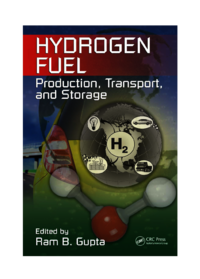Autor "Jayant Kumar"
Se han encontrado 1 Coincidencias
Hydrogen Fuel : Production, Transport, and Storage
103 Visitas | 66 Descargas | 2014-12-06 17:56:00 | raulito
The two most important environmental hazards faced by humankind today are air pollution and global warming. Both have a direct link with our current overdependence on fossil fuels. Pollutants produced from combustion of hydrocarbons now cause even more health problems due to the urbanization of world population. The net increase in environmental carbon dioxide from combustion is a suspect cause for global warming, which is endangering the Earth—the only known place to support human life. In addition, the import of expensive hydrocarbon fuel has become a heavy burden on many countries, causing political and economic unrest. If we look at the past 2000 years’ history of fuels, usage has consistently moved in the direction of a cleaner fuel: wood ? coal ? petroleum ? propane ? methane as shown on the next page. With time, the fuel molecule has become smaller, leaner in carbon, and richer in hydrogen. The last major move was to methane, which is a much cleaner burn than gasoline. Our future move is expected to be to hydrogen, which has the potential to solve both the environmental hazards faced by humankind. Through its reaction with oxygen, hydrogen intensely releases energy in combustion engines or quietly releases it in fuel cells to produce water as its only by-product. There is no emission of smoke, CO, CO2, NOx, SOx, or O3. In fact, the health costs for urban populations can be reduced by switching to hydrogen automobiles. Hydrogen can be produced from water using a variety of energy sources including solar, wind, nuclear, biomass, petroleum, natural gas, and coal. Since renewable energy sources (solar, wind, and/or biomass) are available in all parts of the world, all countries will have access to hydrogen fuel. Hence, a greater democratization of energy resources will occur. Also the use of solar, wind, or biomass in producing hydrogen does not add to environmental CO2. Before widescale use of hydrogen fuel can be accomplished, key technological challenges need to be resolved, including cost-effective production and storage of hydrogen. During the early adoption of hydrogen fuel, government incentives will be needed,
Contribuir
Usted puede contribuir con Libros UCLV, es importante para nosotros su aporte..
Contribuir